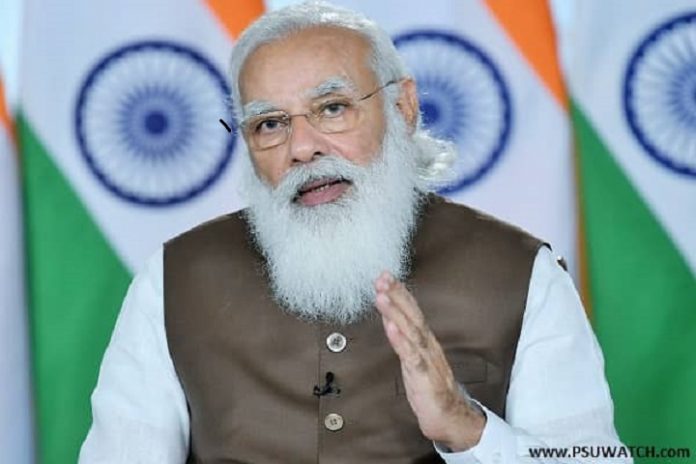Prime Minister Narendra Modi said the Production Linked Incentive (PLI) scheme, aimed to boost domestic manufacturing and exports, is expected to increase the country’s production by $520 billion in the next five years.
At a webinar on PLI schemes, Modi also said that the government aims to reduce 6,000 compliances at the central and state level.
“$520 billion of production is estimated to take place in India in the next five years through PLI alone. There is also an estimate that the workforce will double in the sectors that have been given PLI. This will help increase income and demand,” Modi said while addressing India Inc at the webinar organised by the Department of Industry and International Trade and NITI Aayog.
He said the government has provided for Rs 2 lakh crore in this year’s budget for PLI schemes wherein an average of 5% of production has been given as an incentive.
The Centre has announced 13 PLI schemes in wake of the Covid-19 pandemic last year to encourage large companies to ramp up their manufacturing base and boost exports from India. The total incentives under the PLI schemes, covering sectors such as telecom, electronics, auto part, pharma, chemical cells and textiles, are pegged at Rs 1.97 lakh crore over a five-year period.
“We have to change the situation of exporting to limited products to limited countries from limited locations,” Modi said.
Emphasising that earlier, industrial incentives meant open-ended provisions but now they’re target and performance-based, Prime Minister said: “To bring 13 sectors in such PLI shows our commitment. Besides impacting the respective sectors, they will benefit the ecosystem”.
Modi also said the quality of our products is good, people will be willing to pay extra for it and that India has to attract more cutting edge technology and investment in sectors with core competency.
“Our effort is to reduce 6,000 compliances burden on entities at the state and Central level. With technology, we can get rid of the need to continuously fill up forms,” he said.
The government, Modi said, is working to reduce compliance burden, further improve ease of doing business and cut down logistics costs for the industry.
“We believe the government’s interference in every issue creates problems rather than solutions. Hence, our focus is on self-regulation, self-attestation, self-certification,” he said.
Sectoral impact
In auto and pharma, Modi said PLI will help reduce foreign dependence on auto parts, medical equipment and raw material for drugs while the support given to advance cell batteries, solar PV modules and specialty steel would help modernise the country’s energy sector, giving a boost to India’s own raw material, labour and talent.
Modi said textile and food processing PLI will benefit the entire agriculture sector.
“Like there is Made in India vaccine to protect people from Covid-19, there should be made in India millets to prevent people from falling ill,” he said, referring to the United Nations declaring 2023 as the International Year of Millets.
Modi said the PLI in electronics will improve domestic value addition to 20-30% from 5-10% now. In telecom equipment manufacturing, Rs 2.5 lakh crore production in the next five years is expected and India can benefit from the export opportunity of Rs 2 lakh crore. Similarly, an increase in pharma production of Rs 3 lakh crore and exports of Rs 2 lakh crore is estimated.
“Rs 35,000 crore production was done during the pandemic under the PLI scheme for electronics and a new investment of Rs 1300 crore has come,” he said.
While successful efforts have been undertaken to encourage the Make in India initiative in the last 6-7 years, Modi said to take these efforts to the next level, big steps and improved speed and scale have to be taken.








